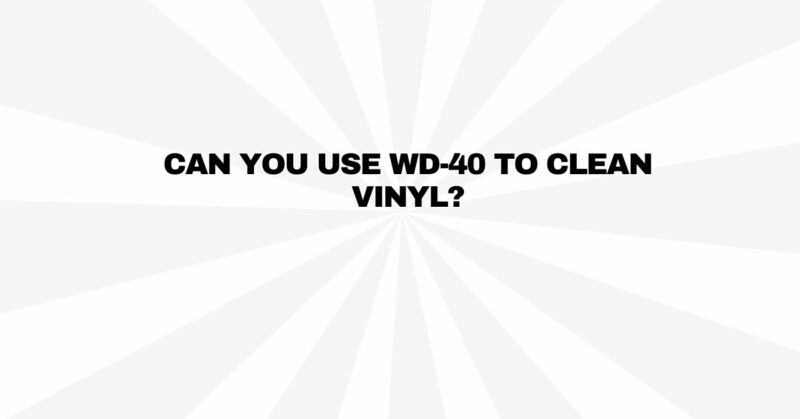Vinyl records have made a remarkable resurgence in recent years, attracting both seasoned audiophiles and newcomers to the world of analog music. Proper maintenance and cleaning of your vinyl records are essential to ensure they sound their best and have a long lifespan. One common question that arises in this context is whether WD-40 can be used to clean vinyl records. In this article, we’ll explore the use of WD-40 as a vinyl cleaning solution, its potential benefits, and the risks it poses to your precious record collection.
What is WD-40?
Before diving into the specifics of using WD-40 on vinyl records, it’s crucial to understand what WD-40 is and what it’s commonly used for. WD-40 is a multi-purpose lubricant and penetrating oil that was originally developed for industrial and aerospace applications. Its name stands for “Water Displacement, 40th attempt,” signifying the number of attempts it took to develop the formula.
Using WD-40 on Vinyl Records:
Using WD-40 on vinyl records is a controversial topic among audio enthusiasts, and there are valid arguments both for and against it. Here are some considerations if you’re contemplating using WD-40 as a vinyl cleaning solution:
Pros:
- Dissolves Stubborn Residues: WD-40 is known for its ability to dissolve and loosen tough residues, such as adhesive remnants from price stickers or tape. Some vinyl collectors have reported success in using WD-40 to remove these stubborn marks.
- Restoring Shine: In some cases, vinyl records may accumulate surface dirt and grime that regular cleaning solutions struggle to remove. WD-40 can potentially restore the shine and luster of your records by dissolving this buildup.
Cons:
- Potential Damage to Vinyl: The most significant concern with using WD-40 on vinyl records is the risk of damaging the vinyl itself. WD-40 contains various chemicals, including petroleum-based solvents, which may react with the vinyl and lead to softening, warping, or even degradation over time. This could irreversibly harm the playback quality and value of your records.
- Residue and Stains: While WD-40 may remove certain residues, it can leave its own oily residue on the record’s surface. This residue could attract dust and debris, making the record even dirtier in the long run. Additionally, any residue left on the grooves may affect playback quality and cause noise or skipping.
- Chemical Interactions: Vinyl records are sensitive to chemical interactions. The chemicals in WD-40 may not react well with the vinyl material or any residual cleaning solutions previously used on the record, potentially causing unforeseen damage.
- Loss of Collector’s Value: If you are a collector or have valuable vinyl records, it’s essential to consider the potential impact of using WD-40 on their collector’s value. Any damage or alteration to the record’s surface can significantly reduce its worth.
Safer Alternatives for Cleaning Vinyl Records:
Given the potential risks associated with using WD-40, it’s generally advisable to opt for safer and proven methods when cleaning vinyl records. Here are some alternative approaches to consider:
- Commercial Record Cleaning Solutions: There are numerous record cleaning solutions available specifically designed for vinyl records. These solutions are formulated to safely remove dust, dirt, and static without harming the vinyl.
- DIY Cleaning Solutions: If you prefer a DIY approach, you can create your own record cleaning solution using distilled water and isopropyl alcohol (preferably 90% or higher). Mix a small amount of isopropyl alcohol with distilled water, apply it to a microfiber cloth or a dedicated record cleaning brush, and gently clean the record’s surface in a circular motion.
- Record Cleaning Machines: For serious vinyl enthusiasts, investing in a record cleaning machine can be an effective and safe way to clean records. These machines use a combination of cleaning solutions, brushes, and vacuum suction to thoroughly clean records.
- Carbon Fiber Brushes: Regularly using a carbon fiber brush before and after each play can help minimize the buildup of static electricity and dust on your records.
Conclusion: Proceed with Caution
While some vinyl collectors have reported success in using WD-40 to address specific issues with their records, it’s important to approach this method with caution. The potential risks of damaging your vinyl records and negatively impacting their playback quality outweigh the potential benefits. Instead, consider safer and proven cleaning methods and invest in proper cleaning tools and solutions to preserve the condition and value of your vinyl collection.


